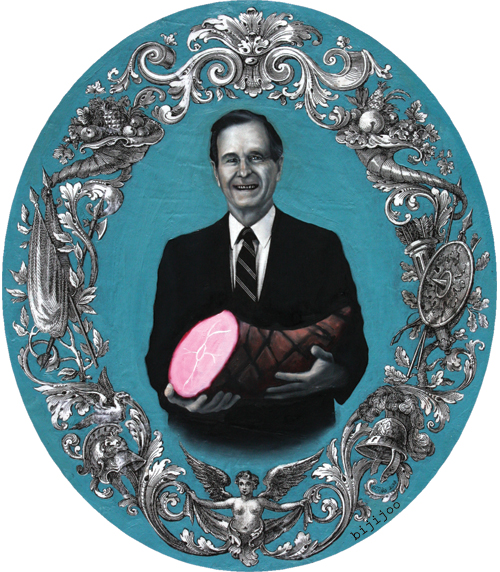

41st PRESIDENT
NAME: George Herbert Walker Bush. He was named after his maternal grandfather, George Herbert Walker, an investment banker. Because his grandfather was called “Pop,” young George was soon nicknamed “Little Pop” and “Poppy”; the latter stuck through his college years.
PHYSICAL DESCRIPTION: Bush stands 6 feet 2 inches tall, weighs about 195 pounds, and has blue eyes and straight brown hair streaked with gray, which he keeps in place with styling mousse. His most distinctive feature is an uneven grin, a Bush family trademark borne by his father and eldest son. He bears a scar on his forehead from a prep school soccer accident and another on the back of the hand from a bluefish bite. He is left-handed. He has been slightly hard of hearing ever since he piloted noisy aircraft during World War II. He is allergic to bee stings and suffers from mild arthritis of the hips, a mild form of glaucoma and a slightly enlarged prostate. In 1960 he underwent surgery for an intestinal ulcer. In 1989 he had a benign cyst removed from the middle finger of his right hand. In May 1991 he was hospitalized for two days for an irregular heartbeat caused by Graves Disease, a disorder in which the immune system attacks the thyroid gland, which in turn becomes hyperactive. Mrs. Bush suffers from the same disease. Medical estimates of the odds of a husband and wife both coming down with Graves Disease ranged from one in 10,000 to one in three million. After undergoing radioactive treatments to destroy his thyroid, Bush was required to take thyroid hormone pills indefinitely.
Bush speaks with a slight lisp and tends to talk rapidly in a moderately high-pitched voice, which drops naturally when he forces himself to slow down. The spare syntax of his speech, commonly devoid of first-person pronouns and replete with phrases posing as complete sentences, was the object of widespread parody. Bush dresses conservatively.
PERSONALITY: “George is not John Wayne,” observed Republican media consultant Roger Ailes. “He’s more like Gary Cooper in High Noon. He’s very gentle. He would much rather talk than fight. But he’s capable of taking care of himself.” After eight years of quiet loyalty to Ronald Reagan, during which he developed a reputation for reserve and deference, Bush emerged as a tough, tenacious campaigner in 1988 and as president earned a grudging respect even from longtime critics for his resolute leadership in the Persian Gulf War. During such times of crisis, Bush pointedly hewed to a normal work and recreation schedule to avoid the appearance of a president under siege. In preparing for a televised wartime address to the nation, he had to delete certain references to civilian causalities, according to Newsweek (January 28, 1991), because he choked up with emotion on the lines during rehearsals and did not want to convey an image of weakness to Iraq. Bush adopted an informal diplomatic style, building personal relationships with other world leaders and keeping in frequent telephone contact with them. As president he was more accessible to the press and less scripted than his predecessor. He liked to hold impromptu news conferences with very little formal preparation. He was more persuasive in small groups than before large audiences. He maintained many of the friendships of his wartime and college years for the rest of his life. Longtime friends described him as warm, witty, engaging, generous, considerate, unpretentious, and unerringly polite, but also flighty at times. “He gets giddy when he’s on a roll,” noted John White, a friend from Texas and former Democratic national chairman. “George has always been kind of like popcorn on a hot griddle.” His awkward gestures, often restrained in public were liked by one observer to those of an errant toy soldier from a Nutcracker ballet chorus. Bush described himself as practical, pragmatic, and down-to-earth. During his twenties and early thirties, Bush was a classic Type A personality, maintaining a breakneck schedule as an independent oilman and worrying constantly over business details. He changes his lifestyle only after a bleeding intestinal ulcer attack literally knocked him to the floor and Dr. Lillo Crain of the Texas Medical Center warned him that he was headed for an early grave. After that he learned to pace himself and ignore problems outside his control.
PRIMARY SOURCE: DeGregorio, William A. The Complete Book of U.S. Presidents. 7th ed. Fort Lee: Barricade Books, 2009.




 ©
©